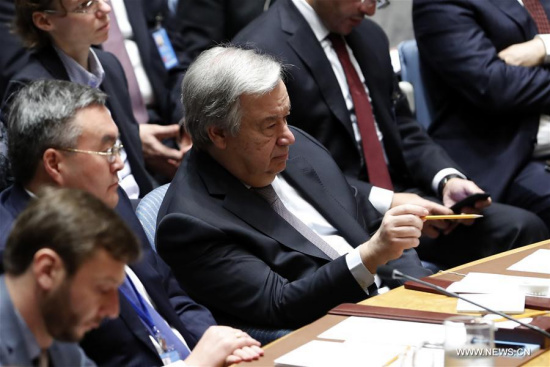
UN Secretary-General Antonio Guterres (R, Front) attends a Security Council meeting on the purposes and principles of the UN Charter in the maintenance of international peace and security at the UN headquarters in New York, on Feb. 21, 2018. (Xinhua/Li Muzi)
UN Secretary-General Antonio Guterres on Wednesday underscored the importance of the proactive approach of prevention instead of responding to crises.
"The international community spends far more time and resources responding to crises than in preventing them. We have to rebalance our approach to international peace and security," Guterres told the Security Council in a debate on the purposes and principles of the UN Charter in the maintenance of international peace and security.
"Our goal must be to do everything we can to help countries avert the outbreak of crises that take a high toll on humanity. And this vision extends beyond wars and conflicts, to natural disasters, fragility and other kinds of stress."
He said crisis prevention is primarily the responsibility of member states. And the United Nations is there to offer support to states in resolving their disputes and preventing the emergence of crises.
He encouraged member states to accept the compulsory jurisdiction of the International Court of Justice, the principal judicial organ of the United Nations, and to make greater use of the court and other international courts and tribunals to help settle and avoid the escalation of their disputes.
The UN Charter confers upon the Security Council powers and responsibilities in the field of conflict prevention, he said. "At this time, it is especially urgent for the Security Council to uphold its responsibility to bring about a political settlement on Syria," he added.
Prevention also depends crucially on advancing sustainable and inclusive development, he said. The 2030 Agenda offers an integrated framework for addressing the economic and social drivers of conflict, and for building stable societies including through a focus on institutions and the rule of law.
The word peacekeeping does not appear in the UN Charter. But this flagship UN activity is firmly rooted in the charter's ideals, and demonstrates the charter's flexibility, said Guterres.
Peacekeeping has a solid record of service, sacrifice and success, and it has ably served as a tool to assist in the peaceful settlement of disputes, as well as to achieve more robust objectives.
However, he said, peacekeeping faces major challenges.
"Often, peacekeepers are deployed indefinitely on dangerous environments where there is little peace to keep, where there are no political solutions in sight, where there are multiple armed groups and where casualties are rising sharply from attacks on peacekeepers."
For these and other reasons, the United Nations ends up serving as a "crisis baby-sitter," or focus on simple containment, he said, "this is simply not sustainable."
He cautioned that peacekeeping is not the solution for all crisis situations. Different contexts may require other kinds of action, including peace enforcement and counter-terrorist operations undertaken by partner regional organizations or coalitions of member states.
He said the UN Charter has stood the test of time. "Drafted following the utter collapse of international order, it helped to stitch the world back together. Drawn up as the full scope of the Holocaust was emerging, it is part of the global bulwark against international crimes today."
"Today, the charter's principles -- non-use of force, peaceful settlement of disputes, non-intervention, cooperation, self-determination and the sovereign equality of member states -- remain the foundation of international relations. The values it proclaims -- equal rights, nondiscrimination, tolerance and good neighbourliness -- remain guideposts for global harmony."
However, he said, the challenges the world faces have evolved, the drivers of conflict have become more complex, new threats have emerged, and the consequences of instability now flow far beyond their source.
"While the charter's principles are as relevant as ever, we must continue to update its tools, we must use those tools with greater determination, and we must go back to the charter's roots for inspiration," he said.


















































